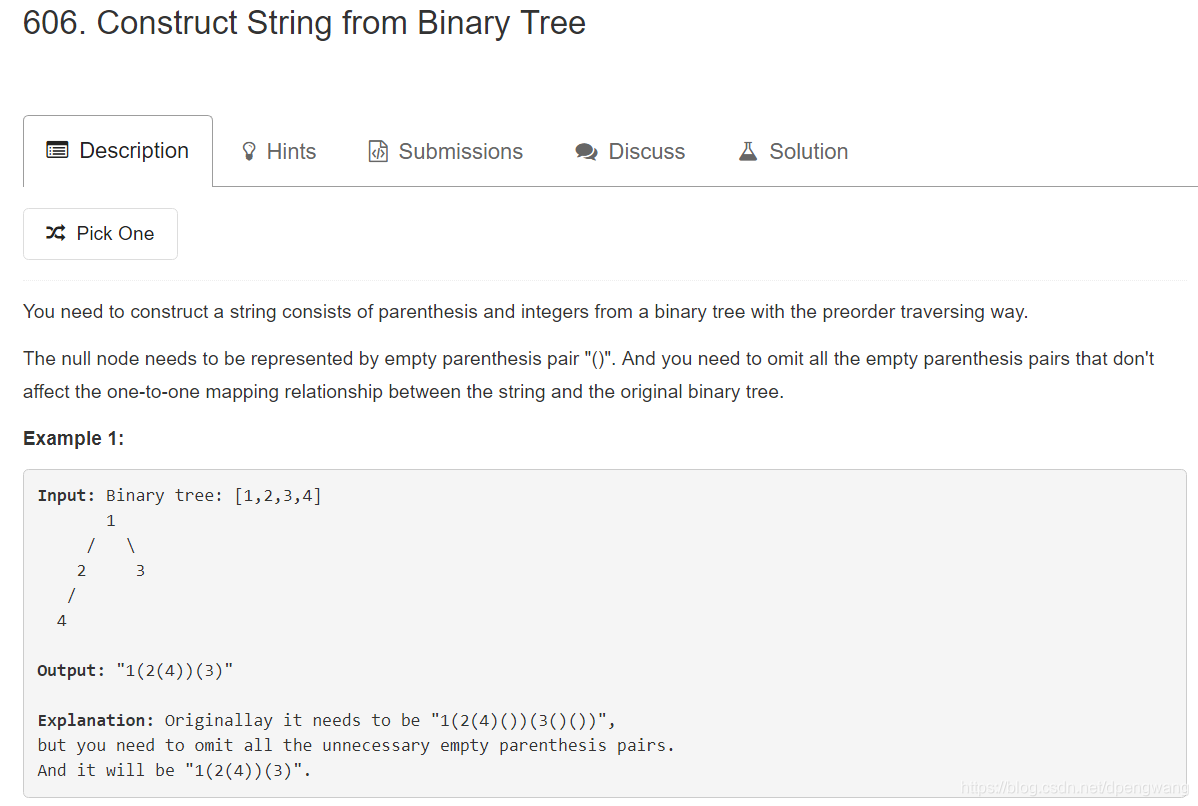版权声明:本文为博主原创文章,未经博主允许不得转载。 https://blog.csdn.net/dpengwang/article/details/88204870

将二叉树以 root(left_child)(right_child)的形式构建成字符串,省去不需要的括号(右子树为None的时候可以不用)
方法1 递归法
当节点为叶子节点时,直接返回值不需要加括号,如果左子树为None右子树不为None,那么左子树的空字符串也要用括号括起来,如果左子树不为None右子树为None,则右子树的空字符串可以省略
class Solution1:
def tree2str(self, root):
"""
:type t: TreeNode
:rtype: str
"""
if root == None:
return ""
if root.left == None and root.right == None:
return "%s" % (str(root.val))
else:
if root.left == None:
return "%s()(%s)" % (str(root.val),self.tree2str(root.right))
elif root.right == None:
return "%s(%s)" % (str(root.val), self.tree2str(root.left))
else:
return "%s(%s)(%s)" % (str(root.val), self.tree2str(root.left), self.tree2str(root.right)
改进后的递归
class Solution1:
def tree2str(self, root):
"""
:type t: TreeNode
:rtype: str
"""
res = ""
if root:
res += str(root.val)
if root.left or root.right:
res += "(%s)" % (self.tree2str(root.left))
if root.right:
res += "(%s)" % (self.tree2str(root.right))
return res
方法2 非递归
后续遍历二叉树,将子树构成的字符串保存在dict中,回溯到父节点时从dict中查找即可
class Solution2:
def tree2str(self, root):
"""
:type t: TreeNode
:rtype: str
"""
if root == None:
return ""
stack, pNode, prev, res = [], root, None, ""
from collections import defaultdict
dictionary = defaultdict(str)
while(len(stack) or pNode):
if pNode:
stack.append(pNode)
pNode = pNode.left
else:
pNode = stack[-1]
if pNode.right == None or pNode.right == prev:
if pNode.left == None and pNode.right == None:
dictionary[pNode] = str(pNode.val)
else:
if pNode.right == None:
dictionary[pNode] = "%s(%s)" % (str(pNode.val),dictionary[pNode.left])
else:
dictionary[pNode] = "%s(%s)(%s)" % (str(pNode.val),dictionary[pNode.left], dictionary[pNode.right])
prev = pNode
pNode = None
stack.pop()
else:
pNode = pNode.right
return dictionary[root]